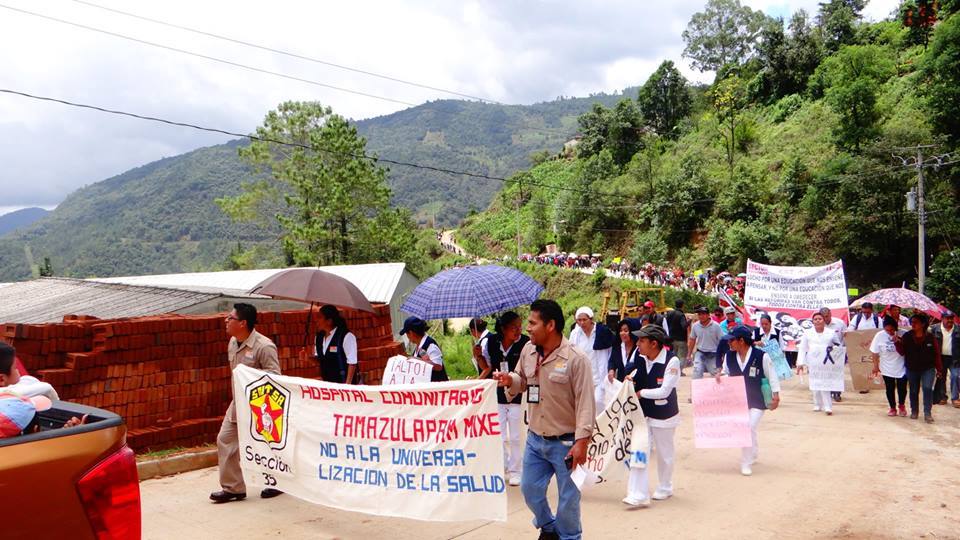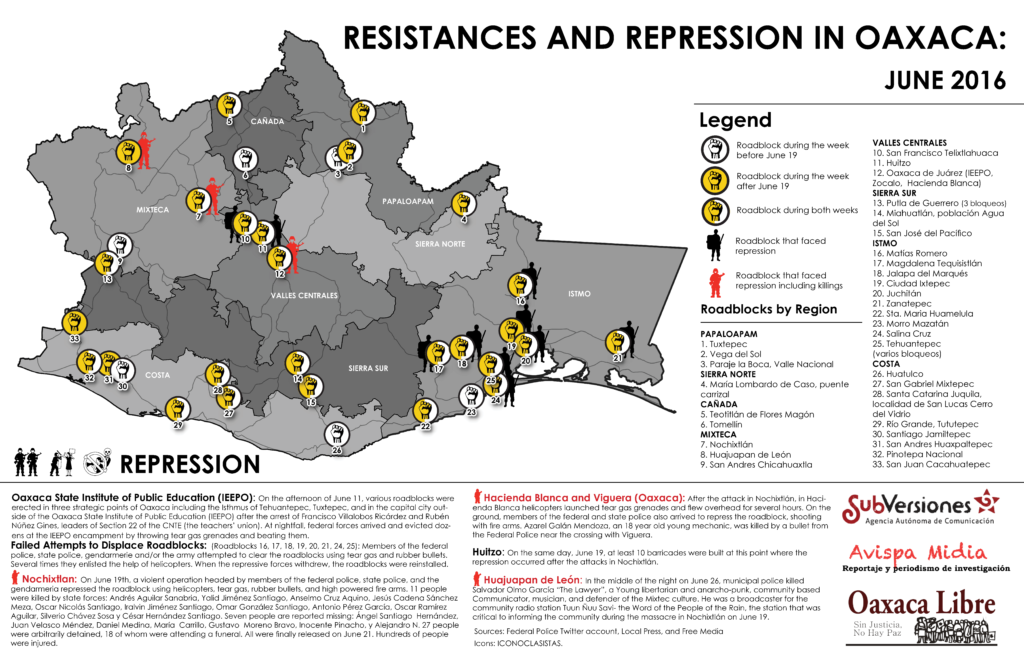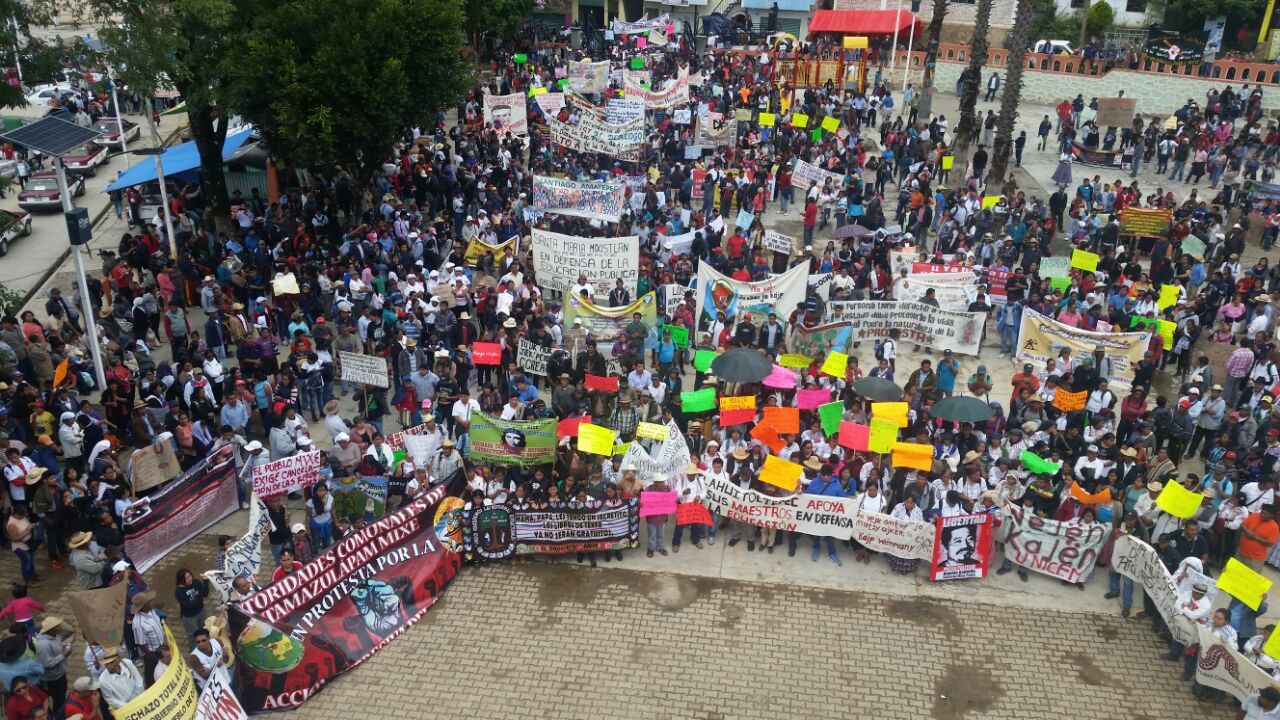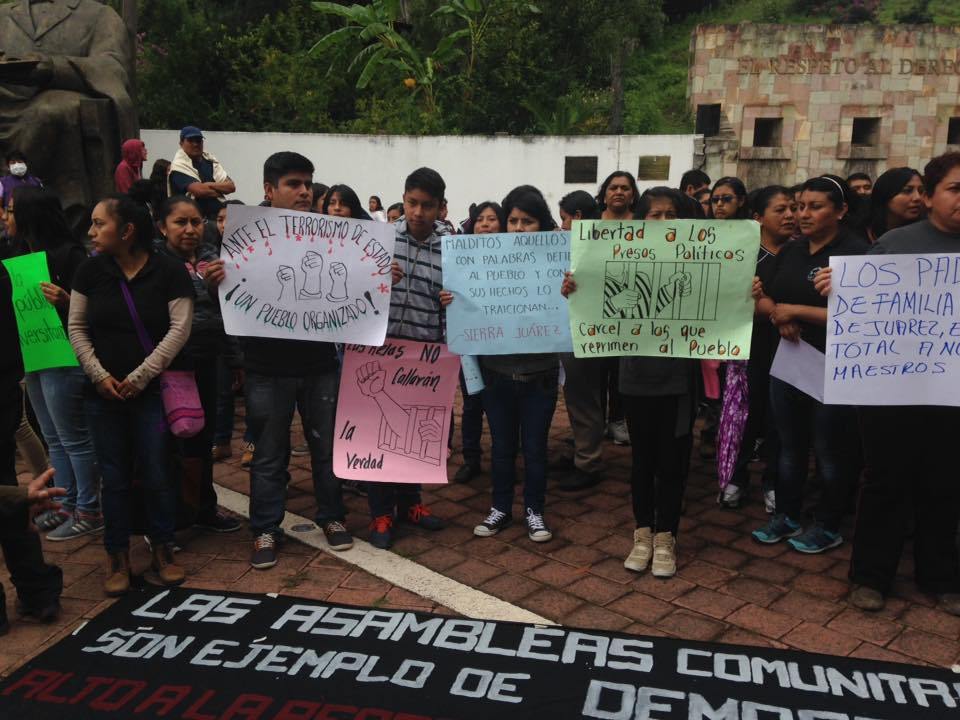Filed under: Editorials, Education, Labor, Mexico

By Simón Sedillo and Niñx Salvaje
Photos by Radio Jenpoj and Estereo Comunal Yeelatoo
From Subversiones
Translated by Scott Campbell
In Oaxaca, 12 people were killed by police between June 19 and 26, 2016, while participating in the current rebellion happening in the state. One of those killed was a teacher, the rest were part of the people. Despite the violent repression, a multitude of blockades remain in place throughout the state, be they temporary or permanent. In addition, thousands of men and women, children, young people, elders and entire communities have rallied in support of the teachers, in repudiation of the repression and against the structural reforms and neoliberal policies that threaten communities. In this context, one thing is clear: the struggle in Oaxaca is not just a teachers struggle but belongs to the peoples who for their part are also fighting for life, territory and autonomy. In Oaxaca, the peoples’ resistance does not begin nor end with the teachers: it began centuries ago and the road ahead is long.
The first reason leading people to express their discontent is the blatant violence used by the government to repress the people. A compañera who is a member of the collective Oaxacan Voices Building Autonomy and Freedom (VOCAL) shares her concern with us:
Ten years ago was very tough and today the repression is more intense. In 2006, the compañeros who died, who were killed by the government, accumulated over time, not all of the sudden. Here we see they came in at close range, to kill, to kill our compañeros. It is a heavy lesson, to know that they are killing the right to life, the right to protest, the right to organize, and faced with this, there is no other option but to organize.
Given that, the demand of the people is clear: the immediate withdrawal of repressive forces from the state. Along those lines, the community of Guelatao declares in a statement:
We demand the withdrawal of the federal police and gendarmerie in order to ensure security and peace for our peoples. In Oaxaca, we don’t need them, we reject them.
The second reason for discontent is without a doubt the imposition by the federal government of the “Educational Reform” as well as all the structural reforms intended to privatize not only education but several other sectors, such as agriculture, health care, and energy.
“The only thing the so-called educational reform is causing is death and a deep contempt for indigenous communities and peoples, for rural and urban communities, as well as for all marginalized social sectors,” denounce the communities of the Ayuujk people.
“It is up to all of us as citizens and people to contribute to this struggle that is not a teachers’ struggle, but belongs to the people of Mexico….The peoples in Oaxaca continue organizing because they know that this is a project of death and extermination coming from capitalism itself, and that there are 12 different reform packages. The government doesn’t care about the people, it only cares about plundering and privatizing everything,” the compañera from VOCAL tells us.
The communities of the Ayuujk people clarify: “As indigenous communities we want to live with education, justice, peace, health care, and food being inalienable expressions of our fundamental rights and not as products to be bought and sold.”
Moreover, in many parts of the Oaxacan territory, resistance is not limited to rejection of these reforms, but as direct organizing against megaprojects trying to be imposed in the area. The compañera from VOCAL continues:
The struggle of the peoples happens day in and day out against these megaprojects that seek to plunder life. And I believe that they started the repression in the Isthmus because they were testing the waters. They knew that in the Isthmus it was not just about educational reform, it was against a transnational project, the wind farms. If they were able to intimidate the compañeros, it would undermine a years-long struggle. On the other hand, when we look at Nochixtlán, it is privatization for mining. What they are licensing away there is the land. And so when people organize, yes, they organized because of the reform, but also because they know that if we don’t stand in solidarity with other struggles that are happening in our territory today, then they’ll finish us off.
The politicians, together with the corporate media and their followers can make their condescending statements, deploring the fact that “the people are allowing themselves be manipulated by the teachers who are taking advantage of their ignorance.” The people, on the other hand, know quite well the unresolved reasons to join the struggle. The compañera from VOCAL shares:
The peoples are well aware of what they want, we don’t need theories or experts to come and tell us how it should be. [We have to] see that the demands are not just against these reforms that are privatizing things, but that they are also in defense of life and territory, and so that in our territory they leave us alone to be as we are. Maybe we are intransigent fools, but we are still the heart of Mexico.
In fact, in their statement, the communities of the Sierra Juárez issued a call to the Oaxaca teachers, encouraging them to assume their responsibilities in the realm of education. In particular, they stressed the need to build educational alternatives that respect and strengthen the identities of the peoples of Oaxaca, instead of imposing content that denies and disregards their ancestral cultures.
We also call on the Oaxacan teachers to resist with responsible proposals, to build educational alternatives and resistance from inside the classrooms. Do not forget that in the recent past, teachers were used to manufacture a single national culture that Indians had to integrate into, which after sixty years of this policy has resulted in half the population that considers itself indigenous and that represents 66% of the total population of Oaxaca do not speak their original languages, nor do the textbooks include the knowledge built up by our ancient cultures. We will no longer allow for this supposed modernity to distort us, in this sense, teachers have the great task of rescuing and strengthening our identities.
The compañera from VOCAL emphasizes:
The peoples of Oaxaca have surpassed the organizing done not only by the teachers but also in the city, by the organizations referred to as “of the masses,” by the political parties that today want to lead this struggle but who from the comfort of their congressional seats voted in favor of educational reform.
On Saturday, June 25, municipal and agrarian authorities from multiple communities gathered in their first “General Assembly of Authorities of the Peoples of Oaxaca,” in order “to discuss and agree on next steps to achieve an end to the repression and a solution to the serious conflict occurring in the state of Oaxaca and in the country due to the imposition of the educational reform and the structural reforms affecting education, health care, territory, biodiversity, the right to water, to maintain our internal administrative systems and our culture and identity, life and dignity.”
On Saturday, July 2, the assembly met again in Asunción Nochixtlán. In its statement, it declared – among many other things: “Today we consider it necessary to advance the construction of a common agenda that unifies the peoples with the teachers, not only to be in solidarity with one another but so that the needs and demands of the peoples are included and that it be a struggle of mutual support, as the peoples have given prisoners, survivors of torture, and dead to the teachers and popular struggles; but where we also demand of our compañero teachers that they move forward on restructuring their ranks and rebuilding as a movement to strengthen the peoples movement.”
That gives another connotation to the struggle as it shows us that the people in the communities are organizing, yes, they have the title of municipal authorities, but they have a much louder voice than anyone here in the city that says they represent a mass organization, that says that they represent a small collective, because they have a moral authority that comes not from the ballot box but from the power of a community assembly that says they are to be the moral authority. Of course I believe that not everyone’s participation is worth the same because they represent peoples, they represent the knowledge and respect from many years of building a different path, – offers the compañera from VOCAL.
Meanwhile, in a statement, the communities of the Ayuujk people put forward a specific demand that lifts up the historic struggles of many indigenous peoples throughout the country:
We demand recognition of the San Andrés Larráinzar Accords, signed by the federal government and the EZLN on February 16, 1996, as constitutional law, as it is a concrete example in the exercise of democracy and of respect for the diversity of Mexico, as sustained by the indigenous peoples and communities.
The San Andrés Larráinzar Accords [1] require not only legal recognition of the country’s indigenous peoples but also a guarantee of the material conditions necessary for their propagation. The tool to ensure such conditions is autonomy, understood as the right to self-government and territory, which includes not just land but culture, traditions, ancestral knowledge, ways of thinking and relating as a community and with nature, among many things.
The compañera from VOCAL concludes:
That is the way, the route is laid out, but I also believe that Oaxaca is very diverse. It has more than 580 municipalities and as such, the autonomies will not be the same. But for me, one thing is clear: the peoples in their communities decide. There remain many decision to be made, such as removing the imposition of political parties, removing the entire structure of electioneering with its representatives, senators, the governor….I believe that this requires a transcendental step but it is not going to happen if we don’t organize together. There is much hope and I believe that the only way to stay alive is the building of autonomy for the peoples in Oaxaca.
Undoubtedly, the teachers struggle remains an important one in the state of Oaxaca and in the country. However, it is also necessary not to forget that the resistance is not limited to the compañerx teachers. That thousands of men and women, from a multitude of peoples and communities, are also struggling daily to build a different path, just and dignified. The government can lie and threaten repression, but to expect to contain this rebellion is another matter.
[1] See “San Andrés y el diálogo pendiente: Especial sobre los Acuerdos de San Andrés” on Radio Zapatista.
All the complete statements and more photos can be found here.
The post Oaxaca 2016: “This is not a teachers’ struggle, it belongs to the people of Mexico” is available on El Enemigo Común. Please share it with your friends.








